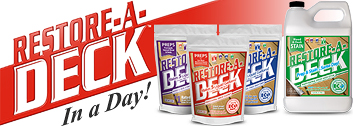It’s highly important to protect your exterior wood surfaces such as decks, fences, wood siding, outdoor furniture, and other exterior structures. These surfaces are subjected to unforgiving weather conditions during all seasons. A quality wood stain will save you time and money spent on wood maintenance.
Unlike paint, which forms a film atop the surface, wood decking stains penetrate the surface providing better protection and allowing the wood characteristics to show through. Whether you want to make the wood grain pop out with a semi-transparent deck stain or hide it with a more solid color, it’s important that you provide some measure of protection. Another choice is whether to go with oil based deck stain or water based.
Water based wood stains will normally adhere better to a surface that has formerly been painted or stained with an oil based stain. A water based stain will also retain its color better than oil. They are more breathable meaning they won’t trap moisture which can cause a stain to fail. Other factors worth noting with water based stains are fewer odors, a quicker drying time, are non-flammable, and they clean up with soap and water. Water based wood stains are usually recommended for woods that naturally resist rot and decay, for example cypress, redwood, and cedar.
Oil based wood stains are commonly suggested for wood decks, fences, gazebos, and other surfaces exposed to harsh weather. They offer better penetration than a water based stain and excellent durability in tough conditions. A longer drying time is expected, but this actually allows the stain to accomplish a more even finish.
Hybrid Deck Stains
Some deck stain manufacturers offer a hybrid wood stain consisting of both water based latex and oil. These hybrid type wood stains offer some of the benefits of both water and oil based stains.
Choosing an exterior wood stain should depend on the situation and the surface you are staining. Many factors can determine whether you should use an oil or water based stain. Ask yourself what you are looking for in a stain – durability over better color retention – easy cleanup over a more even finish and so on. Research the stain and see what others are saying about it before you make a decision and be sure you are getting a quality wood stain so you get the results you want.




6 comments
I have white paint spots on my deck. What is the best way to cover these with a deck stain product ?
Probably should sand them off first.
I’m building a new deck (cedar) and I’m torn between oil vs. water based stain. I live in the Seattle area so we get a lot of rain.
Which one do you think would work better for this climate?
Also: is there a difference in appearance between water and oil-based stains? I tested a few water-based stains (semi-transparent) and I didn’t like the quality and truthfullness of the color, I don’t know how to put it, it seemed as if dry particles were coloring the wood that I could just scratch off, vs. the oil stain’s more natural slick look. To put it differently, with the water based stain, it was very obvious to me that the wood didn’t show its natural color and was “painted”, whereas the oil-based stain looked more natural, as if the wood itself had a different color.
Oils penetrate better but waters have better mold resitance. If choosing water based I would look at the Defy Hardwood Stain. If oil, I would look at TWP 1500 Series.
In general oils penetrate better so they show the wood grain more realistically. Defy does offer the best penetrating water based stains on the market.
Can you put oil based deck stain over water based stain?
It depends on the brands but in most cases that would not be a good idea. Could have issues with adhering.